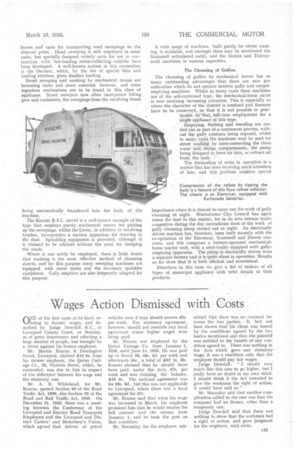Wages Action Dismissed with Costs
Page 83

If you've noticed an error in this article please click here to report it so we can fix it.
riNE of the first cases of its kind, re
lating to drivers' wages, and described by Judge Dowdall, K.C., at Liverpool County Court, on Monday, as of great importance and affecting a large number of people, was brought by a driver against his former employer.
Mr. Martin Kearns, 9, Dorrington Street, Liverpool, claimed 216 9s. from his former employer, the Quinn Cartage Co., 20, Victoria Street, which, he contended, was due to him in respect of the difference between his wage and the statutory rate.
Mr. A. E. Whitehead, for Mr. Kearns, quoted Section 93 of the Road Traffic Act, 1930, also Section 32 of the Road and Rail Traffic Act, 1933. On December 21, 1932, there was a meeting between the Conference of the Liverpool and District Road Transport Employers and the Liverpool and Di-strict Carters' and Motormen's Union, which agreed that drivers of petrol vehicles over 2 tons should receive 67s. per week. The statutory agreement, however, should not override any local agreement where higher wages were being paid.
Mr. Kearns was employed by the Quinn Cartage Co. from January 1, 1935, until June 14, 1935. He was paid up to March 29, 48s, 5d. per week and afterwards 55s., a total of £62 Is. Mr. Reams claimed that he should have been paid, under the Acts, 67s. per week and was claiming the balance, £16 9s. The national agreement was for 58s. 6d., but this was not applicable to Liverpool, where there was a local agreement for 67s.
Mr. Kearns said that when his wage was increased in March, his employer promised him that he would receive the full amount and the arrears from January 1, and he took the post on that .condition.
Mr. Macaulay, for the employer, sub
mitted that there was no contract between the two parties. It had not been shown that his client was bound by the conditions agreed by the two bodies mentioned and that the plaintiff was entitled to the' benefit of any condition agreed to. There was nothing in the Acts which gave any statutory • wage; it was a condition only that the employer should pay fair wages.
Judge Dowdall: "I should very much like this case to go higher, but I really have no doubt in my own mind. I should think if the Act intended to give the workman the right of action, it would have said so."
Mr. Macaulay said that another complication added to the case was that the company had no licence, other than a temporary one.
Judge Dowdall said that there was nothing to show that the workman had a right of action, and gave judgment for the employer, with costs. '


























































































































































